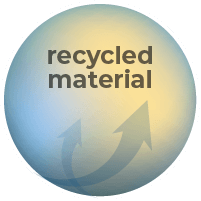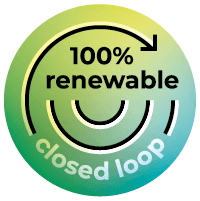Circular Economy

Advancing Circular Artificial Grass Solutions with Domo® Infinitum
Economic growth without depleting natural resources is a core priority of the EU Green Deal. For the artificial grass industry—and for Domo® Sports Grass—this means innovating our products to support waste reduction and long-term sustainability.
Our goal is not only to minimize waste but to ultimately eliminate it, contributing to a fully circular economy within the sports turf sector.
 Circular Turf Innovation: Turning Waste Into Value
Circular Turf Innovation: Turning Waste Into Value
The term “waste” often carries a negative meaning, but in many cases, what one industry discards can become a valuable resource for another. The same holds true for the synthetic turf industry.
With our Domo® Infinitum technology, we’re redefining waste as a source of value—both in product development and end-of-life processing. Our approach to circular artificial grass works in two key directions:
-
Creating value from waste: By repurposing production or post-consumer materials into new turf components.
-
Creating waste with value: By designing products that are recyclable and reusable at the end of their lifecycle.
Through these innovations, Domo® Sports Grass is not only complying with sustainability goals—we’re helping to shape a waste-free future for artificial grass systems.
Artificial Football Grass Made from Post-Consumer Recycled Plastic

Sustainable turf solutions by Domo® Sports Grass
At Domo® Sports Grass, we believe in creating value from waste. That’s why we offer artificial turf systems made with post-consumer recycled plastic materials—sourced from other industries and backed by the ISCC Plus certification for sustainability and traceability.
Why Post-Consumer Recycled Plastic Over Bio-Based Alternatives?
While bio-based materials like sugarcane-derived plastic can help reduce CO₂ emissions, they are often tied to water-intensive agriculture and large-scale land use. That’s why Domo® Sports Grass prefers post-consumer recycled plastics—a more resource-efficient and environmentally responsible solution that:
-
Conserves natural resources
-
Reduces plastic waste
-
Supports local and regional sustainability goals
Fully Recyclable & Circular Artificial Grass Solutions
 When designing any artificial grass system, we ask: What happens at end-of-life?
When designing any artificial grass system, we ask: What happens at end-of-life?
Every Domo® artificial turf pitch is at least recyclable, but we also go a step further. Through our innovative Domo® Infinitum technology, we offer truly circular artificial grass systems—meaning your pitch can be closed-loop recycled once it reaches the end of its service life.
This process allows recovered materials to be transformed into new synthetic grass fibres or repurposed into plastic components for other industries—helping us turn waste into valuable resources and advancing the circular economy in the sports turf sector.
Recycling old turf as a shareholder of GBN-AGR
 The great advantage of sports turf is that when a layer is installed or renewed, the waste management is completely in the hands of the installer. If the Domo® Sports Grass team does the installation of your sports pitch, we make sure that the old artificial grass is taken to a recycling plant. To put this even more into practice, we are a shareholder of GBN Artificial Grass Recycling, located in The Netherlands. In this way, we encourage other artificial turf installers to manage their waste in the same way.
The great advantage of sports turf is that when a layer is installed or renewed, the waste management is completely in the hands of the installer. If the Domo® Sports Grass team does the installation of your sports pitch, we make sure that the old artificial grass is taken to a recycling plant. To put this even more into practice, we are a shareholder of GBN Artificial Grass Recycling, located in The Netherlands. In this way, we encourage other artificial turf installers to manage their waste in the same way.
See how GBN-AGR works
Create value from waste, create waste with value, create a circular sports field

Why should we move to a circular economy?
- To avoid the depletion of natural resources: The world population is growing significantly, with the result that our consumption is larger than what the earth can offer in resources. A circular economy helps to save the earth’s natural resources.
- To reduce waste and pollution: Manufacturing of different products can lead to pollution of air, water, and soil and delivers waste, during and after the end of its life cycle. Creating a circular economy can reduce pollution and waste by reuse and recycling.
- Create new jobs: A circular economy creates new chances for entrepreneurs and employees in the sector of recycling.
- Innovation: The goal of creating a circular economy triggers innovation related to product development and manufacturing processes. This can lead to new and more efficient technologies.
The transition to a circular economy is a challenge, but it is a challenge we must rise to. With the commitment of governments, businesses, and sports clubs, we can create an economy that is sustainable, and fair and creates prosperity for all.
Feel free to contact us
Do you want to know more about how we are making our products circular? Or do you want to know more about our eco-friendly artificial grass solutions?
Complete the form and our representative will contact you shortly:
How do we enable sustainability in our business and products?

Frequently asked questions
Can you recycle artificial grass?
Yes, artificial grass is recyclable.The artificial grass range of Domo Sports Grass is at least recyclable into other products. With the Domo Infinitum backing, we can make fully recyclable artificial grass in closed loop circuit. In other words: it becomes 100% renewable.
Is artificial turf made from recycled plastic material?
Whether your artificial grass is made from recycled plastic or not, depends on the manufacturer. Domo Sports Grass offers a range of products you can ask to produce with post-consumer recycled plastic materials. We are therefore ISCC Plus certified and unique in this.
What is the difference between bio-based and renewable materials?
Bio-based raw materials are derived from living organisms, such as different types of crops, wood, and algae. Renewable resources can renew themselves within a certain period of time. These resources can be used sustainably without exhausting natural resources in the long term. They do not always come from biological sources, but also from sources as sunlight or recycled waste material.
Is biobased the same as biodegradable?
Biobased plastics are manufactured entirely or partially from biological sources. However, it's essential to note that biobased plastics do not inherently imply biodegradability or compostability.